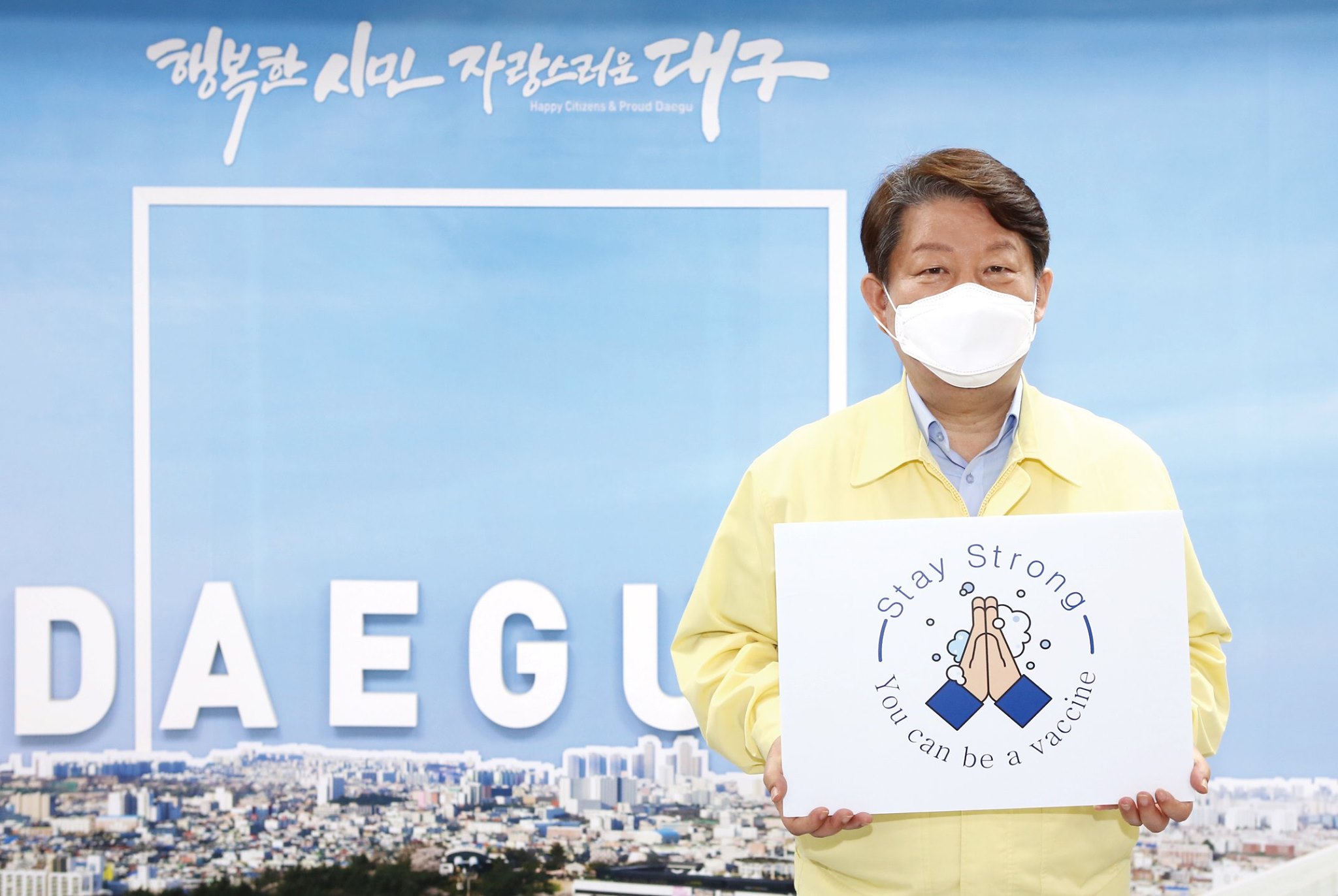- 한국어
- English
- 日本語
- 中文
- العربية
- Español
- Français
- Deutsch
- Pусский
- Tiếng Việt
- Indonesian
By Honorary Reporter Isabelle Pia Sison from the Philippines

(Daegu city mayor Kwon Young-jin's facebook)
Living in another country can be daunting during this time of global uncertainty. The Korean Ministry of Justice recently announced that as of last year, the foreign resident population was 2,524,656.
For Ngo Thanh Hoai, a Vietnamese national living in Daegu since 2018, the situation has been quite unsettling especially since she has a 1-year-old child. Her city earned notoriety from the media as it was the epicenter of the coronavirus outbreak in Korea. Her fear of getting infected grew since she lives three minutes away the church of Shincheonji, the religious sect that allegedly caused the coronavirus to spread nationwide.
In an interview, she shares her experience as a foreign resident of Daegu amid the pandemic.
How was living in Daegu when it was the outbreak's epicenter in Korea?
At the beginning of the outbreak, we had limited to no availability of essential foods, instant noodles and water at well-known supermarket chains such as Homeplus and Emart. This problem caused the government to increase supply and make sure that the people had access to all essential items.
During the peak of the outbreak, all forms of public transportation were empty and even taxis were not visible. The only mode of transportation for most people -- private cars -- was the only option to move around the city. Many locals also felt the risk of staying in Daegu, with some of them temporarily moving to other cities. A good number of workers continued to commute to their offices while others opted to work from home. Students, on the other hand, just stayed home instead of going to lectures in their classrooms. For many, they chose to stay at home to ensure their safety and wellness.
What were the best government measures?
The Korean government's numerous efforts have slowed the widespread of COVID-19. It carried out mass testing to detect infections in the early stage. In a relatively short time, more than 300,000 people were tested, and an effective way to promote testing was drive-thru screening clinics.
Transparent communication has also been a major contributor to the flattening of the curve in Korea. Each day, the government provides briefings on the number of new confirmed cases, deaths, recoveries and regional distribution of cases. They also continuously send tips and reminders of do's and don't's to prevent COVID-19. Digital platforms have also been effective gateways for sharing public information such as online videos showing the proper washing of hands, the correct way to wear protective masks and the benefits of following home quarantine guidelines.
The Daegu municipal government has impeccably provided complete information through its official homepage and sent automated text messages to residents on updated data. When an infection is detected, the city conducts contact tracing to check the time and places the patient might have visited and contact with other people. City residents can simply go to the website to access this information to easily avoid risky places. The city also closed the places visited by those testing positive for two weeks.
What public support have foreign residents received?
Foreign residents in Korea have received a lot of support from the government. First, the government has provided all information related to the pandemic in English for the sake of those with limited fluency in Korean.
A coronavirus information center was opened with service available in English, Vietnamese, Filipino, Mandarin (Chinese), Punjabi (Pakistan), Nepali, Mongolian and Uzbek (Uzbekistan). The Seoul Global Center also assisted those needing information in languages not mentioned above.
Medical treatment for those infected with the coronavirus, regardless of nationality, has been free as well. Some cities have also given cash allowances to foreign residents to assist them with their living expenses.
These support programs have helped ease the anxiety and concerns of foreign residents in Korea.
With Korea seen to be flattening the curve, what changes in your daily life have you experienced? Have you engaged in leisure activities since the easing of restrictions?
During the first two months of the outbreak, my family just stayed at home. We didn't eat out or even go out at all. We just ordered food online and used our car when we had to go out. We wore masks even with family members and even ate separately. My son's grandparents definitely missed their grandson a lot as we just saw each other through a window.
Now that the situation has gotten better, our family can go to playgrounds that my son enjoys. We sometimes eat out, and my family members still go to work but remain careful and vigilant. Ultimately, our daily lives have improved.
Do you feel relatively safe now in Daegu? What tips do you have for those planning to visit?
The situation surrounding COVID-19 infections in Daegu and Korea has relatively improved, but the fight against the coronavirus remains a global issue. I do feel much better and safer than before but of course, we still worry that another outbreak could occur. Daegu is such a beautiful city and visitors will definitely enjoy their stay here. I recommend visiting the city after the COVID-19 situation has been controlled in all parts of the world. For now, just stay home and visit Daegu when the situation returns to normal.
chaey0726@korea.kr
*This article is written by a Korea.net Honorary Reporter. Our group of Honorary Reporters are from all around the world, and they share with Korea.net their love and passion for all things Korean.